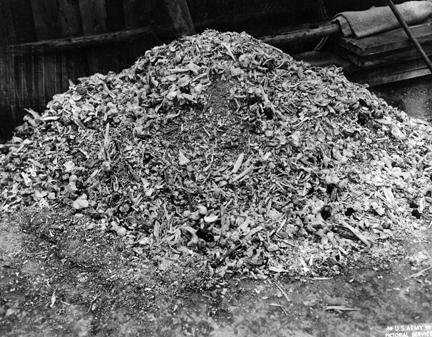April 14, 1945 – Pile of ashes and bones found by U.S. soldiers at Buchenwald concentration camp in Germany.
April 12, 1945 – Dwight D. Eisenhower views the charred bodies of prisoners at Ohrdruf concentration camp.
Cameron Stewart: “The Maisel Twins: Polish Jews who survived the Holocaust reach Their 100th Birthday,” 7 August 2022, https://thuppahis.com/2022/08/07/the-maisel-twins-polish-jews-who-survived-the-holocaust-reach-their-100th-birthday/
Fiona Harari: “Profound Testimonies: Aged Holocaust Survivors in Their Last Testaments,” 27 January 2018, https://thuppahis.com/2018/01/27/profound-testimonies-aged-holocaust-survivors-in-their-last-testament/
 Zygmunt Swisrak: “Overcoming Hate: A Lesson for Tamils and Sinhalese from A Holocaust Survivor,” 28 January 2018, …………………………………………………. https://thuppahis.com/2018/01/28/overcoming-hate-a-lesson-for-tamils-and-sinhalese-from-a-holocaust-survivor/
Zygmunt Swisrak: “Overcoming Hate: A Lesson for Tamils and Sinhalese from A Holocaust Survivor,” 28 January 2018, …………………………………………………. https://thuppahis.com/2018/01/28/overcoming-hate-a-lesson-for-tamils-and-sinhalese-from-a-holocaust-survivor/
https://mhm.org.au/ …. the Melbourne Holocaust Museum
https://www.ushmm.org/ …. US HolocaustMemoriam Musuem
PLUS ………………… Roughly Comparative Motifs
Michael Roberts: “Anguish as Empowerment …and A Path to Retribution,” 22 March 2017, https://thuppahis.com/?p=24595&preview=trueWalia
Michael Roberts: “Kill Any Sikh: The  Anti-Sikh Pogrom of 1981 in Delhi in Bilawan Singh’s Images,” 26 March 2017, https://thuppahis.com/2017/03/26/kill-any-sikh-the-anti-sikh-pogrom-of-1984-in-delhi-in-bhawan-singhs-images/
Anti-Sikh Pogrom of 1981 in Delhi in Bilawan Singh’s Images,” 26 March 2017, https://thuppahis.com/2017/03/26/kill-any-sikh-the-anti-sikh-pogrom-of-1984-in-delhi-in-bhawan-singhs-images/
A Hindy Mob hunting Muslims at Bhagalpur in India in late October 1989 …. see https://en.wikipedia.org/wiki/1989_Bhagalpur_violence#:~:text=The%20Bhagalpur%20riots%20of%201989,and%20250%20villages%20around%20it.
Michael Roberts: “The Agony and Ecstasy of a Pogrom: Southern Lanka, July 1983,” Nēthra, April-Sept 2003, 6: 199-213 ……. 
….. A violent mob at Borella Junction in Colombo 23/24 July 1983 … Pix by Chandragupta Amarasinghe






Very interesting. It prompts deeper thinking:-
Why does ‘holocaust’ have to be solely tales of ethnic community victmisation/targeting? The massacre of humans (i.e. killing on a mass scale) can happen irrespective of ethnic differentiation. Also the nature of the mass killng/elimination need not be instantaneous or even something perpetrated over a short period of a few years. Actually, even when the targeting is that of a specific ethnic group or cluster of ethnies, the systematic elimination has happened over a century or even longer period (e.g. the Caribs, and, right now, the Palestinians). And what about the starvation and death of socio-economic classes? Such as peasantry famines of early modern Europe or even later? Such as the famine mass deaths in Ireland? There are many concrete case examples already highlighted in historiography and available to be included in such ‘tale’ listing, no? The episteme of your current list blinds us to much savagery parallely occurring. I doubt whether this notably narrow episteme is in accordance with scholarly disciplinary selectivity. Is the selectivity more ideological than scholarly? ‘Ideological’, that is, in terms of usage conventions for ‘holocaust’. You are a pastmaster in analysis of ideology. I have learnt much. Your response will certainly teach me more.
Sri Lanka has yet to establish a Museum of International standard devoted solely to display the crimes committed against humanity during colonial rule. The Portuguese Inquisition (1505-1658), the Dutch destruction of the Dalada Maligava and looting of the King’s Palace in 1765 (some of the looted items are now exhibited at the Rijksmuseum in Amsterdam), and the death and destruction of the Kandyan Sinhalese peasantry under unjust Waste Lands Ordinances commencing from 1841, are worthy of being told to both local and foreign visitors. It will also pay tribute to the Freedom Fighters of Sri Lanka during colonial rule.
Almost every former European colony has such a Museum dedicated to the country’s freedom fighters except Sri Lanka. This shame is compounded by the lack of interest to show the people of the colony (Ceylon) as victims of rapacious colonialism under the very same countries that now play the hypocritical role of inquisitors in International fora more specifically at UNHRC in Geneva.
New Book – Freedom Struggles of Sri Lanka – Lessons Learned and the Way Forward (2021)
This astounding scholarly tome is destined to capture the breadth and imagination of the patriotic people of Sri Lanka, whose ancestors fought for the liberation of the country from foreign incursions since 1505 A.D.
Editor: Professor C.M. Madduma Bandara et. al.
The book is available at Godage Bookshop.
Price Rs. 6000 per copy
“The new publication by Godage International Printers by Prof Madduma Bandara- a well-known scholar, under the Title: “Freedom Struggles of Sri Lanka -Lessons Learned and the Way Forward” contains some useful information and analyses of relevance to the present difficulties faced by Sri Lanka in the international arena. Among other things, a chapter on “Çolonial Crimes of British Ceylon” by an eminent lawyer – Senaka Weeraratna, compiles wide-ranging evidence of crimes against humanity committed by the British colonial rulers. It builds a strong case that may even lead to seeking reparations. Among the other chapters, the final ones on the future scenarios and “Way Forward”, may undoubtedly prove useful for the present-day political leadership. Its future prognosis is equally powerful since it employs some scenario development methodologies. The book also unravels some rare historical sources like the ‘British Parliamentary Select Committee Report of 1850, which found fault with high personalities such as Lord Torrington for his questionable role in the suppression of the Matale Rebellion through brutal means. While valuing such attempts by the British Parliament of the day for their yearning for further inquiry, it also provides many lessons for present-day parliamentarians.”